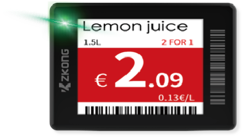The Benefits of Using Electronic Shelf Labels: A Comprehensive Guide

In the rapidly evolving landscape of retail, technological advancements play a pivotal role in streamlining operations and enhancing customer experiences. One such innovation that has gained significant traction is the implementation of Electronic Shelf Labels (ESL) or Digital Shelf Labels (DSL). This comprehensive guide explores the myriad benefits associated with the adoption of ESLs, shedding light on how they revolutionize the retail environment.
Understanding Electronic Shelf Labels: A Brief Overview
Before delving into the advantages, it is crucial to grasp the essence of Electronic Shelf Labels. ESLs are digital devices that replace traditional paper price tags on store shelves. These labels leverage wireless communication technologies to display product information, prices, and promotions electronically. The transition from conventional pricing methods to ESLs brings about a transformative impact on various aspects of retail operations.
Enhanced Pricing Accuracy and Efficiency
One of the primary advantages of incorporating Electronic Shelf Labels is the improvement in pricing accuracy. Traditional paper tags are susceptible to human errors, resulting in discrepancies between the displayed price and the actual product cost. ESLs, on the other hand, enable automatic updates, ensuring real-time synchronization with the central pricing system. This not only minimizes pricing errors but also enhances operational efficiency by eliminating the need for manual price adjustments.
Dynamic Pricing Strategies for Competitive Edge
In the fiercely Digital Shelf Labels, staying agile with pricing strategies is paramount. ESLs empower retailers to implement dynamic pricing strategies effortlessly. With the ability to update prices in real-time, businesses can respond swiftly to market fluctuations, competitor pricing changes, and even implement time-sensitive promotions. This flexibility provides a crucial edge in attracting price-sensitive customers and adapting to dynamic market conditions.
Streamlining Inventory Management
Efficient inventory management is a cornerstone of successful retail operations. ESLs contribute significantly to this aspect by facilitating seamless inventory tracking and management. These labels can be integrated with inventory systems, allowing for automatic updates on stock levels, product availability, and reorder notifications. This integration minimizes the risk of overstock or stockouts, optimizing inventory turnover and ensuring that customers find the products they need when they visit the store.
Personalized Customer Experiences
The integration of ESLs opens up new avenues for creating personalized customer experiences. These digital labels enable the easy implementation of customer loyalty programs, personalized promotions, and targeted advertising based on customer preferences. By leveraging customer data and analytics, retailers can tailor their offerings to individual preferences, fostering stronger connections with their customer base and enhancing overall satisfaction.
Time and Cost Savings for Retailers
Traditional price tag updates involve a considerable investment of time and resources, especially in large retail environments. ESLs significantly reduce the time and cost associated with manual price adjustments. Retailers can remotely update prices and product information across the entire store or multiple locations simultaneously. This not only streamlines the operational processes but also allows staff to focus on more value-added tasks, ultimately contributing to increased productivity and cost savings.
Environmental Sustainability
The adoption of Electronic Shelf Labels aligns with the growing global emphasis on sustainability. Traditional paper labels contribute to environmental waste, as they often need replacement and disposal. ESLs, being digital and reusable, significantly reduce paper waste in the retail environment. The long lifespan of these electronic labels further minimizes the environmental impact, making them a sustainable choice for retailers committed to eco-friendly practices.
Improved Customer Engagement and Satisfaction
ESLs play a crucial role in elevating the overall customer shopping experience. The dynamic and visually appealing displays attract customer attention, making product information easily accessible. Additionally, the ability to provide real-time information on prices, promotions, and product details enhances transparency, building trust with customers. The interactive nature of ESLs, such as the incorporation of QR codes for additional product information, further engages customers and contributes to heightened satisfaction.
Compliance and Security Benefits
In industries with stringent regulatory requirements, such as the food and pharmaceutical sectors, accurate and up-to-date labeling is essential for compliance. ESLs ensure that product information, including expiration dates and regulatory compliance details, is consistently accurate. Furthermore, the digital nature of ESLs enhances security by reducing the risk of tampering or unauthorized label changes, providing an additional layer of protection for both retailers and consumers.
Future-Proofing Retail Operations
The retail landscape is continually evolving, and the ability to adapt to emerging technologies is crucial for long-term success. ESLs represent a future-proof solution for retailers looking to stay ahead of the curve. As technology advances, these labels can be easily updated and integrated with new systems and features, ensuring that retailers can embrace future innovations without the need for a complete overhaul of their labeling infrastructure.
Conclusion:
In conclusion, the adoption of Electronic Shelf Labels presents a myriad of benefits that extend beyond mere pricing efficiency. From enhancing customer experiences and streamlining operations to contributing to environmental sustainability, ESLs have emerged as a transformative force in the retail sector. As the retail landscape continues to evolve, businesses that embrace the digital transformation facilitated by ESLs position themselves for sustained success and competitiveness in the dynamic marketplace.
- SHARES

Ashmawi Sami has a Bachelor degree in Travel and Tourism Management from the University of Minnesota. He has his own travel vlogging channel. Besides being a fantastic yoga instructor he has travelled to 9 countries and planning his next trip soon. As the father of 3 dogs, he is well-trained in parenting, crowd control, and crisis situations.
ABOUT ME

Gillian is a freelance blogger, student, and full-time traveler. Each day she spends her time exploring something exciting to help people find the information they need while travelling to a new destination. Whether it be the place to enjoy holidays, or a spot to throw a party or hidden gems that you must visit in the city.
ALL CATEGORIES
- Adventure (13)
- Automotive (8)
- Business (664)
- Education (13)
- Event (4)
- Health (285)
- Indibet App 740 (1)
- Insurance (11)
- Lifestyle (12)
- News (1)
- Real Estate (19)
- Shopping (26)
- Technology (22)
- Travel (6)

JOIN US TODAY
POPULAR POST
January 27, 2021 -
Adventure Travel For The Audacious Spirit
January 27, 2021 -
Small Business Loans for Women
January 27, 2021 -
Adventure Tours in Vanuatu
RECENT POST
April 23, 2025 -
Indibet Review Inside India, Free Of Charge Bets And Offers: Cell Phone In Addition To Desktop Functions For 2025
Remain abreast regarding the newest info in inclusion...
July 30, 2024 -
The Magic of Books About Music: Exploring the World of Sound and Harmony
Music is a universal language that transcends cultures...
July 30, 2024 -
Enhancing Songs Education: An Overview to Crucial Resources and Materials
Music education and learning is a lively and...
July 29, 2024 -
AI in Social Media: Impact and Opportunities with Mavic
Artificial Intelligence (AI) has revolutionized many industries, and...














